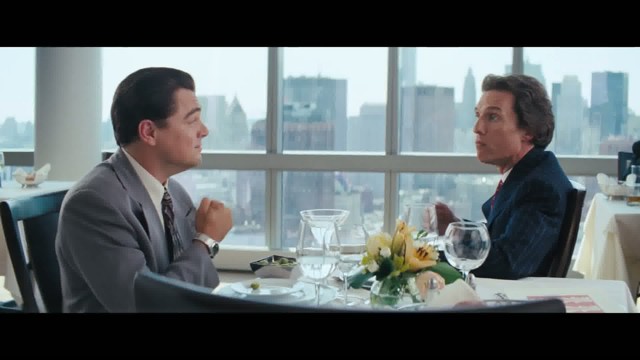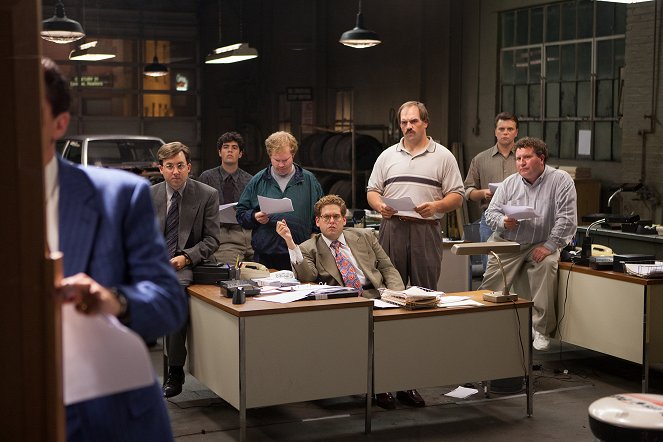Directed by:
Martin ScorseseScreenplay:
Terence WinterCinematography:
Rodrigo PrietoComposer:
Theodore ShapiroCast:
Leonardo DiCaprio, Jonah Hill, Margot Robbie, Matthew McConaughey, Kyle Chandler, Rob Reiner, Jon Bernthal, Jon Favreau, Jean Dujardin, Joanna Lumley (more)VOD (5)
Plots(1)
Revered filmmaker Martin Scorsese directs the true story of New York stockbroker Jordan Belfort (Leonardo DiCaprio). From the American dream to corporate greed, Belfort goes from penny stocks and righteousness to IPOs and a life of corruption in the late 80s. Excess success and affluence in his early twenties as founder of the brokerage firm Stratton Oakmont warranted Belfort the title – "The Wolf of Wall Street." (Universal Pictures UK)
(more)Videos (39)
Reviews (19)
I have a terrible urge to use profanity whenever I think of The Wolf of Wall Street. So for once, excuse me if I say Leonardo is a great fu*king actor, unrivaled in America after that performance. I may not be a fan of drug movies, but they just made something more out of it here. I'm just sorry that Matthew McConaughey didn't stick around a little longer, because his goofiness is really perfect. This movie is an addiction! 5 stars.
()
Leonardo DiCaprio transforms into Matthew McConaughey in this biopic, which chokes on itself. For as long and as fast as The Wolf of Wall Street talks, it ultimately says surprisingly little. Like The Great Gatsby, another attempt to explore the self-destructive potential of capitalism from last year, Wolf also entertained me more with its form than with its content. ___ Scorsese has dealt with the central theme of male frustration arising from the inability to reach the top and stay there several times (most evocatively in Raging Bull). What makes this film different is mainly its tone, degree of excess and greater emphasis on the ritual dimension of boorish behaviour. Sex, drugs and drinking have gained a common denominator in the form of dollar bills, for which anything and anyone can be bought. The film doesn’t condemn money – and there is the question of whether anyone should take it seriously in such a case today. On the contrary, it genuinely acknowledges that money can buy loads of pleasure. The ambiguous final scene with Agent Denham (is he smiling?), who together with Belfort’s first wife is the only one who acts with any sense of morals, leaves it up to us to judge whether he is happy or regretful that he didn’t take Belfort’s offer. (Denham comes across as a being from a different, human world also thanks to Kyle Chandler’s acting). Scorsese puts us in a similar “decide for yourself” position multiple times, e.g. during Belfort’s slow crawl to the Lamborghini. The scene isn’t made humorous with music or with a well-timed cut. It is rather several static shots without musical accompaniment. We are not encouraged to laugh at the protagonist; that’s only somehow expected of us. ___ At the same time, a second viewing of the etude with the Lamborghini, unforgettable thanks particularly to DiCaprio’s physical performance, which is reminiscent of Jerry Lewis and other masters of physical comedy, reinforced my suspicion that Scorsese did not have an entirely clear concept of how to shoot the individual parts of the film and then put them together. With the exception of the aforementioned scene, it more or less applies that the less cool the film is, the more seriously we should take it. The rapid dolly shots, the overhead shots, the slowed or quickened movement, the loud music (the choice of which is governed by whether we are watching the bacchanalia or, for example, another stock-market success) – these are all indicators that Belfort has the narrative fully under his control. From the prologue (white Ferrari, not red), however, Belfort shows himself to be an unreliable narrator who doesn’t tell the truth, or at least not the whole truth. Other characters and the film’s narrative itself have to repeatedly set the record straight and tell us what really happened (the S&M evening, the rampage on the airplane, the return from the Country Club). The scenes without music and Belfort’s boastful commentary, handled using the standard shot-countershot technique, are often more critical of the “hero’s” actions and give the impression that we are receiving facts in a purer form, unfiltered by Belfort’s view. But in “his” scenes, Belfort occasionally commits an offense that an impartial (and absent) film narrator avoids – he puts himself down (eleven-second coitus, self-ironic quoting of Browning’s Freaks). Is that supposed to be a surprising violation of the rules (such as the later conferment of the voice-over to other narrators, namely Saurel and Aunt Emma), or is it proof that the film does not respect any rules in its extravagant indiscipline? ___ Of course, the composition of the plot from various mad incidents is not as random as it may seem. The narrative moves ever forward thanks to the rhythmically well-thought-out introduction of new characters and revealing of new information, and thanks to the intensification of the motifs pointing out the striking contrast (played superbly by DiCaprio) between the Jordan who has ambition and a knit sweater and the Jordan who has everything. Whether The Wolf of Wall Street has a clear concept or not (it probably does, but I didn’t find it even on the second viewing), and whether or not it is sexist in its exploitation of the female body (it probably is, because Naomi uses her sex appeal as a weapon), the new Scorsese film remains an entertainingly provocative black comedy (or horror musical?) that pulsates with incredible (masculine) energy for the whole three hours and likably does not try to foist upon us any moralistic wisdom about the harmfulness of money, egoism and various forms of immoderation. 85%
()
(less)
(more)
The Wolf of Wall Street has rightfully become one of the most important events of the season. It accurately captures the atmosphere of a time marked by an economic crisis and surprises with the realization that not everyone tightens their belts equally during times of need and that human justice falls short when it comes to certain assholes, whose rhinoceros hides are evidently impenetrable. If nothing else, we will take revenge on them on the silver screen. The Wolf of Wall Street is reminiscent of a wild party, from which, aside from the exhilarating feeling of tasting forbidden fruit and crossing the boundaries of socially acceptable behavior, you will likely remember only a few shocking escapades and excesses after a few days. The film depicts a series of parties, revelry, drug trips, and an insatiable desire for wealth in a somewhat stereotypical and thus tiresome manner. It tells the story of a group of brokers who do not hesitate to destroy the lives of naive clients with offers of worthless stocks from obscure companies. The film is reminiscent of Lord of War and Trainspotting with its absence of moral dimension and final catharsis. In all three cases, we are dealing with scoundrels who ultimately succeed and get away with it, despite minor setbacks and losses. Scorsese proves that old age does not necessarily mean a loss of connection with modern cinema. Quite the opposite, as the same can be said for him as for vintage wines - the older, the better. He rivals Fincher in camera skills, enjoys crowd scenes, and effortlessly handles action sequences, such as sinking a yacht in a stormy sea. He varies the rhythm and slows down the shots, and a single detail can reveal more about his characters than any other director could describe in an entire film. A separate chapter is dedicated to DiCaprio's performance in the lead role. Villains are always more rewarding for actors. DiCaprio revels in the role of a cynical, unscrupulous businessman, delightfully showcasing his boundless hedonism, narcissism, and manipulativeness. It is said that when actors enjoy filming, the audience cries over their paychecks, and vice versa. This is clearly not the case here. Both DiCaprio and Jonah Hill clearly enjoyed the overdose scene, which is brilliantly comical and will likely become a revered classic among film fans. DiCaprio promises, seduces, bribes, and threatens, and above all, presents a study of a man obsessed with himself and navigating an endless drug trip. Despite the aforementioned, I have to give it the highest rating. The Wolf of Wall Street is like a hyperactive, self-centered child that persistently demands attention. Its coolness eventually becomes tiresome. Paradoxically, I realized that I would have enjoyed the film more with a shorter runtime and fewer gags. Overall impression: 85%.
()
Such a sophisticated ode to money, sex, drugs, and immense debauchery that I almost forgot that, in reality, such people seem overdue for a good slap in the face. Yet even if I had spent the entire three hours merely studying the movements of the wolf king Leonardo DiCaprio in fascination, it would still have been worth it. Sharp monologues, the casting of prostitutes, or cerebral palsy may be the high points, but all throughout DiCaprio delivers a performance at the edge of human capabilities, which might appear casual and relaxed, but must have required a level of effort greater than ever before. Still, it is a shame that Scorsese expands the scope to an unnecessarily broad extent. Even my love for overdramatic stories that don't know when to stop being told could not prevent me from being even slightly bored by the last hour running a bit freely. Martin Scorsese and Leo yet again know how to do it and take unbelievable delight in their talent. And yet they miss absolute center, whether they make a buck or not, by a field.
()
A three-hour long joyride full of sex and cocaine, cool and base at the same time, trying to hide behind the proverb “sow the wind, reap the whirlwind”. I enjoyed myself immensely and I’ll definitely watch this again, but I don’t consider one dramatic scene (with the daughter in the car) to be enough for a three-hour film. The Wolf of Wall Street has perfect catchphrases and is never boring, but it made me realize that this type of Scorsese movie (starting with Casino) is great to watch but won’t leave you with lasting impression. Shutter Island, dark and mystical, perfectly escalated, with a surprising, sophisticatedly ambiguous ending, is much closer to my heart, and I consider it Scorcese’s masterpiece.
()


